The current Crimea crisis involving Russia and Ukraine is likely to throw its shadow on Goa, affecting the number of Russian tourists in the sunny state. A look at how Goa is getting increasingly Russia-nised with burgeoning numbers turning pockets of the feniland into a little Moscow
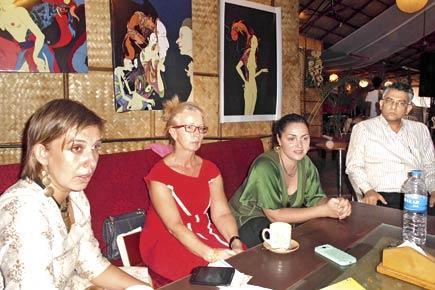
Remember the Boney M song ‘Rasputin’? It ends with the sigh “...oh, those Russians...” Well, those Russians are now swarming all over the beaches in Goa, with nearly half of all the foreigners visiting the sunny state coming from Russia or other countries of the former Soviet Union like Ukraine, Belarus, etc. Everywhere you go - beach shacks, restaurants and hotels in the touristy areas, you find menus and shop signs in two languages: English and Russian.
ADVERTISEMENT
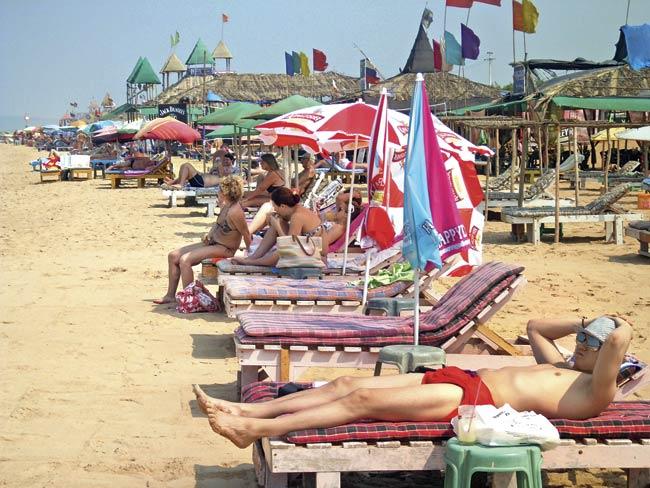
Russian charter tourists on the beach at Candolim
Lingo
That’s because most of the Russians don’t know a word of English, and, apparently because of some fierce nationalistic pride, refuse to also learn it. This often leads to some strange situations. On a recent river rafting trip, this writer had to - of all things - learn Russian, because all the others on the rafting boat were Russians.
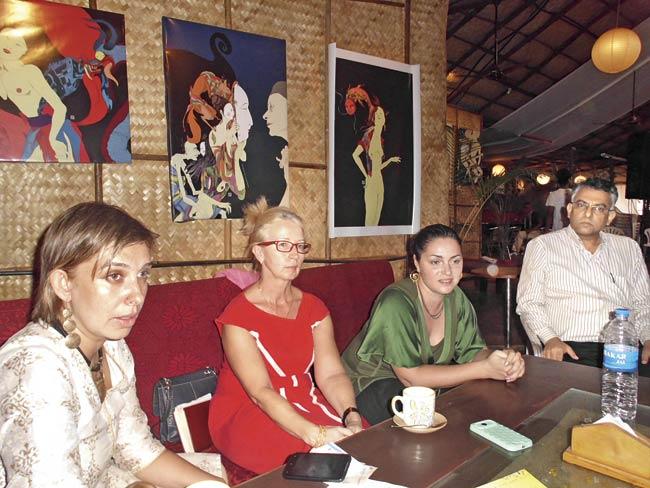
(From left) Ekaterina Belyakova of Tara Travels, Jolina Kokhta of Surya Travels, Anastasia Gritsay, editor of Krasta Goa, and Vikram Verma, legal counsel for the Russian Consulate during the ‘Peace Jam’
Since the majority were Russians who did not understand a word of English, the guide who travels in the boat and shouts out rafting instructions - row in front, row backwards, etc - had to shout out the instructions in Russian. Forward rowing? Vpiriot - pronounced piriot! Backward - nasad. Hold on - dershez. Over left - na lieva. Over right - na prava.
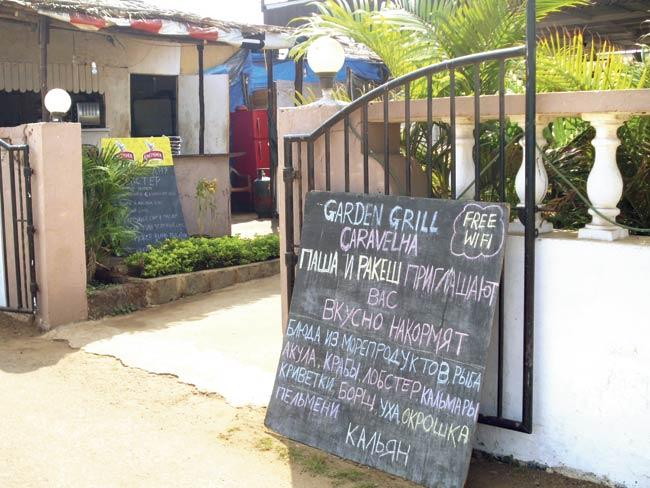
A typical scene outside a restaurant in Goa, with signboards in Russian offering tandoori chicken, king prawns, etc
Centres
All the tribal lamani women who sell trinkets on the beaches now speak fluent Russian, as do many vegetable vendors in the local markets in the beach belt. The Russian government has also set up a Russian Information Centre (RIC) with two offices in Goa, one in the north in Candolim, and another in south Goa at Benaulim, two areas which are major hubs for Russian charter tourists.
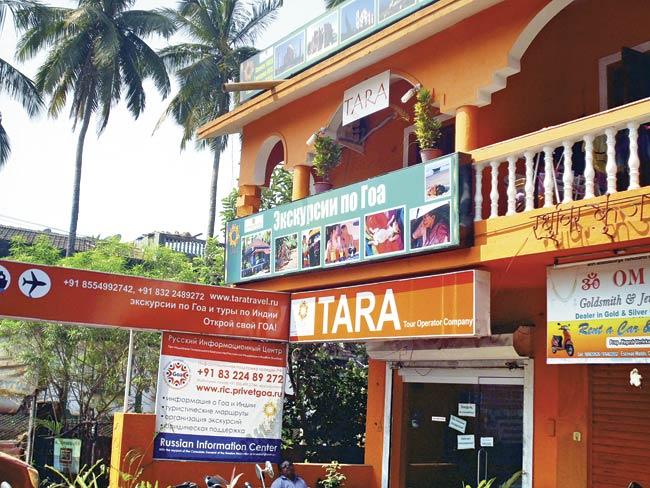
The Russian Information Centre in Candolim
The RIC operates a 24-hour helpline for Russians, and also publishes a bi-monthly magazine in Russian, Krasta Goa (Colours of Goa), which is probably the first Russian magazine in India. It is distributed free at hotels, restaurants, etc, and is sort of a travel magazine.
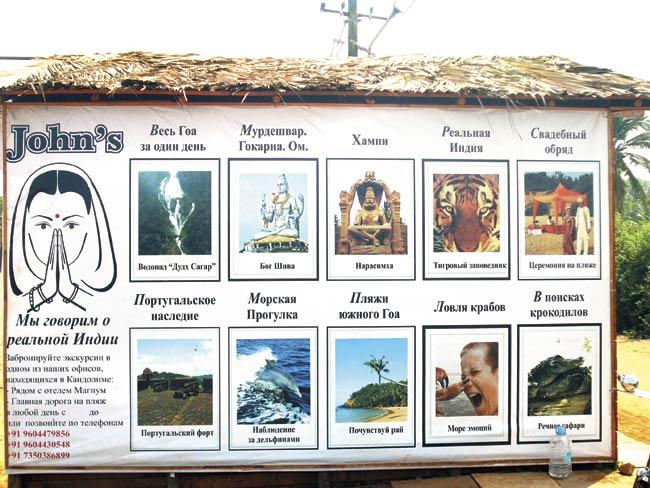
A boat operator’s outlet with all-Russian information
Moscow
“Russians like Indian culture and love Goa. They’re fascinated by Indian mythologies like the Mahabharat and Ramayana,” explains Ekaterina Belyakova, the head of RIC and a partner in Tara Travels, one of the biggest Russian-linked charter tour operators in Goa.
While typically the Russian charter tourists spend between a week to a fortnight in Goa, there are others who come and stay for extended periods of a few months, while around 500 Russians are permanent residents in Goa.
Most of the long-staying Russians stay in Morjim in north Goa, leading to the village now being dubbed ‘Little Moscow’ or ‘Little Russia’ with most of the shop signs in Russian, and even Russian-run restaurants and hotels.
While the svelte, young Russian women in bikinis make a pretty sight, the aggressive behaviour of some of the Russian men has created a lot of resentment against them, which has also been exacerbated because of the language barrier.
Problems
Last year, a local taxi driver was beaten to death in a brawl with a Russian in Morjim. In February this year, a waiter in a beach shack at Calangute had his face slashed with a knife by an infuriated Russian tourist. In recent months, Russians have been at the receiving end too, with taxi drivers targeting Russians working as tour guides.
Only Goans can register as tourist guides with the Tourism Department. But since Russians only speak Russian, and none of the Goan tourist guides speak Russian, many of the larger tour operators who take the Russian tourists sight-seeing employ Russian ‘translators’ for the convenience of the Russian tourists.
Deportation
Most of these Russian translators, however, come on tourist visas which do not permit them to work in Goa. Consequently, taxi operators, not always the best of friends with the Russian tourists, in recent months detained a number of tour buses which were ferrying Russian tourists along with the translators and handed the translators over to the police. This season alone has seen 12 Russians, including Russian-speaking persons, being deported for acting as tourist guides and for acting as marketing persons selling sight-seeing trips.
Safety
The Russian tourists in the buses were also heckled, abused and some were even man-handled, leading to an uproar back home in the Russian media that Russian tourists were not welcome in Goa, according to Ekaterina Belyakova. The latest incidents happened in February.
Alarmed at the situation, Russian charter tourist operators went into damage control mode. “When a Russian tourist lands in Goa, the first thing they ask our representatives is whether it is safe to be in Goa because they have read and heard back home that Goans don’t like Russian tourists,” says Ekaterina, who herself is married to an Indian.
Work
Acknowledging that there are Russians working here without work visas, Belyakova says, “There are cases when Russian people staying in Goa for several months on tourist visas start working. The Russian consulate as well as our centre is trying our best to inform Russian tourists that this is against regulations.
Recently, we issued a set of instructions for Russian tourists covering these issues as well. We are informing people that they can work in Goa only if they obtain business or employment visa and work only with companies that have registered business and all licences in place.”
Translators
She along with other Russians and Goans with stakes in the travel and tourism industry are hopeful that the Goa government will step in to provide a solution to the language problem by allowing Russians on business or work visas to work as translators accompanying Russian tourists. The reason: more than 200,000 Russians will be visiting Goa this season, and that figure could go up to a million in a few years if the Goa government resolves this issue, she says.
Numbers
The increase in numbers has been meteoric. According to figures provided by Ralph De Souza, spokesperson, Travel and Tourism Association of Goa (TTAG), the apex tourism industry body in Goa, 59,803 Russian (including from former Soviet Republics) charter tourists visited Goa during the 2009-10 season. That rose to 88,954 in 2010-11, 96,032 in 2011-12 and 152,061 in 2012-13. The tourist season in Goa lasts from November to May, peaking in December.
Around 50,000 Russians visited Goa during December last. Goa receives nearly three million tourists every year, out of which around five lakh are foreign tourists, with Russians the biggest group. Most of these come as charter tourists, while around 30-40,000 are free-of-itinerary travellers (FIT). It’s these FIT Russians who stay for extended periods around the party hotspots of Anjuna and Morjim, the latter being dubbed Little Moscow.
Discord
Following the recent trouble, the RIC even organised a ‘Peace Jam’ musical event at a pub in Calangute to bring down the levels of discord. Says Ekaterina, “The developments in the Goa tourism industry with conflicts between taxi drivers, tour operators and incidents involving foreign tourists had quite a negative impact on the atmosphere. We would like to preserve the atmosphere of freedom, peace and positiveness. This is one of the main treasures of Goa.”
Drop
However, some local tourism industry sources say the number of Russians visiting Goa has tapered off since the incidents in February, and Russian tourist arrivals could be hit in the next season. Initially, tourism stake-holders said this was because of the February incidents, but there are also rumours that the ongoing crisis in Ukraine could also affect the inflow of the Russian and Russian-speaking tourists from the former Soviet Union.
Asked to clarify the situation, Gleb Syshchenko, head of sales at Tara tour operator said, “Despite the unstable situation in Ukraine the tourist inflow from Ukraine to Goa has not decreased. We have noticed a slight increase in budget segment, though, as people prefer budget trips to more expensive ones right now.
Tara is among the few operators in Goa that are receiving Ukrainian tourists. There are about seven flights coming from Ukraine weekly, Air Arabia flights and several charter flights coming from Kiev, Odessa and Kharkov. As of now we did not notice any cancellations. Although Ukrainian tour operators started revising their packages for coming summer months, it won’t affect Goa in this season,” he says.
Disappointing
But Russian consul general in Mumbai Alexey A Novikov says the recent incidents could be the reason. “The tourist influx might be affected by incidents provoked by the so-called ‘taxi drivers’ against Russian tour operators and even against Russian and Ukrainian tourists, such incidents having lately become disappointingly frequent.
We share a common approach to the issue with the Goa government, as Chief Minister Manohar Parrikar appreciates the contribution of Russian tourism to the Goan exchequer. But if incidents of this kind are repeated, we can exercise our generally-acknowledged right to recommend to our citizens alteration of their tourist routes. The Consulate General of Russia in Mumbai never refuses assistance to any Russian-speaking tourists - Ukrainians, Belorussians, Kazakhs and others.”
Blacklist
Jolina Kokhta of Surya Travels, another large Russian charter operator, says they have already blacklisted a few resorts in south Goa where local taxi operators have been creating problems. According to her, Russian tour operators and other services like translators are needed, because otherwise the Russian tourists will stop coming. According to the Russian tour operators, in places like Egypt or Turkey, the hotels have staff who speak Russian, which is not the case in Goa.
Cancellation
February’s incidents involving taxi drivers had come close on the heels of an Indo-Russian music festival in Goa, featuring leading bands and musicians from India and Russia, being cancelled at the last minute, causing the organisers to lose Rs 2.2-crores.
In Morjim too, some beachside shacks and restaurants which had become party hotspots with Russians had their licences cancelled recently because of late-night parties. Restaurants have to stop playing loud music at 10 pm, unless they have special permissions which come with higher fees.
Says Seby Fernandes, a Goan hotelier, “These young Russian tourists are different from, say, the British charter crowd which is mostly of retired people. The government should do something about these sound restrictions because otherwise they will stop coming.” It is an ominous prediction by a savvy hotelier which must resonate through the state of sand, sea, sorpotel, fun, feni and, for now, Russians.
 Subscribe today by clicking the link and stay updated with the latest news!" Click here!
Subscribe today by clicking the link and stay updated with the latest news!" Click here!






